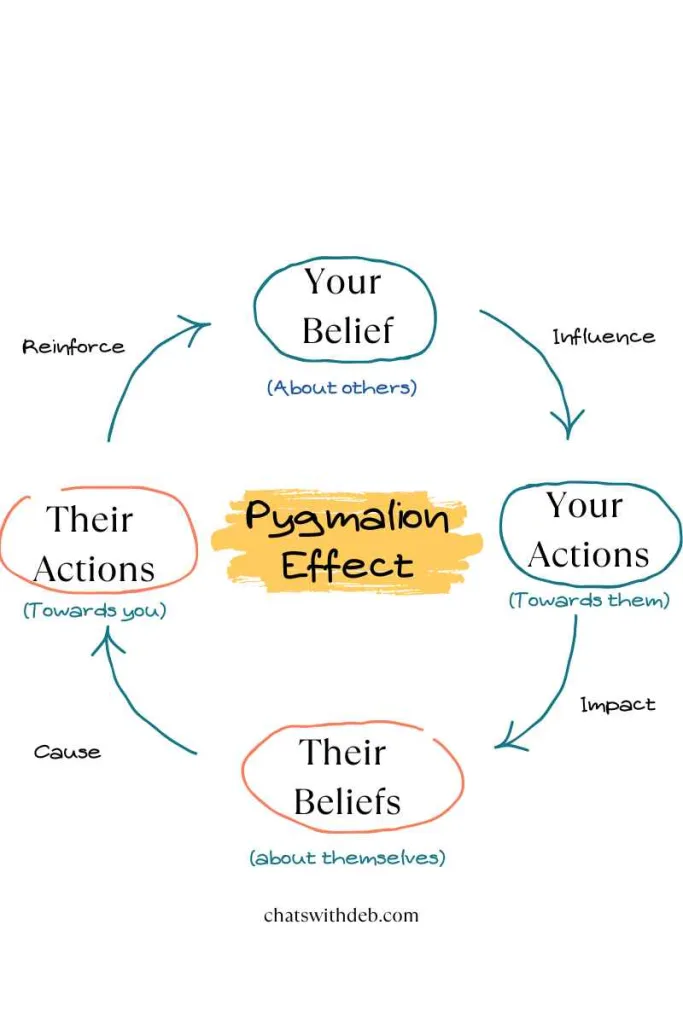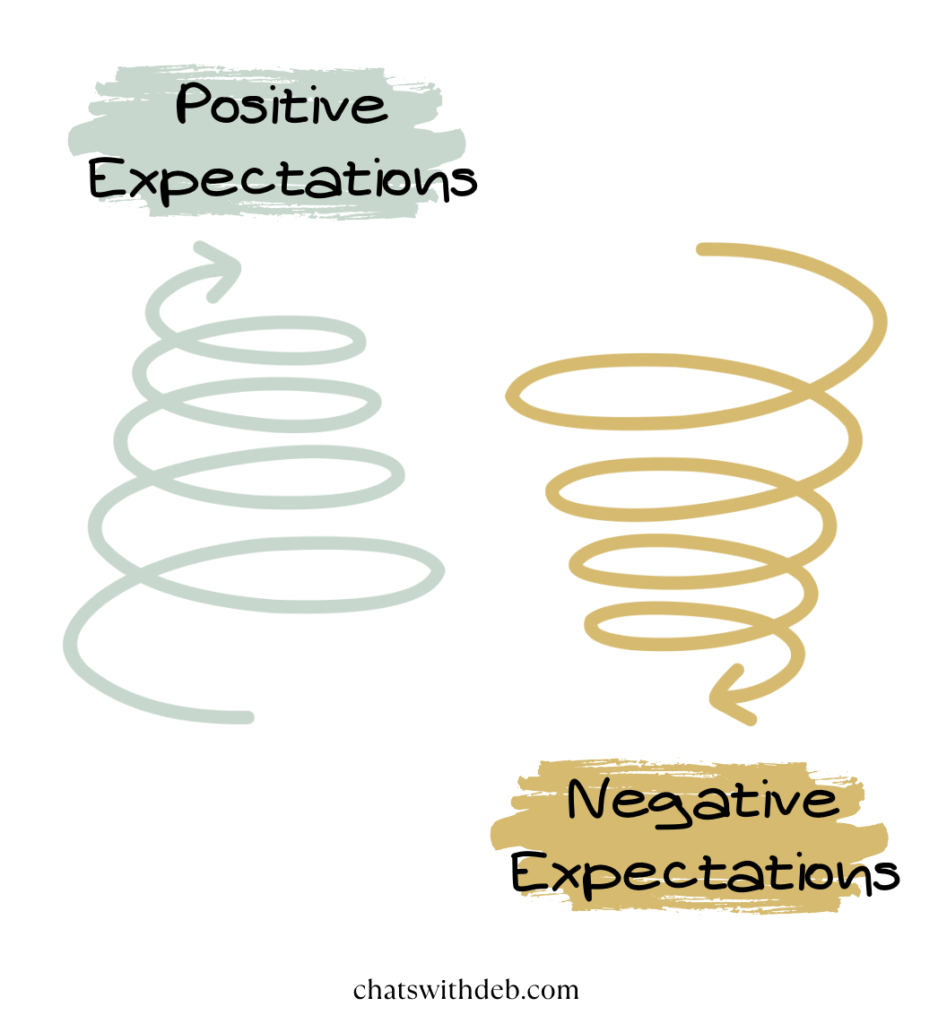What if I told you the expectations others have of you is a determining factor in whether you’re successful or not? And that what you believe about others will determine how they act towards you? So much resistance comes up when I think about this concept, how could my success be that easily influenced by others? Yet, as I dug into behavioral psychologist Rosenthal’s concept of the Pygmalion effect, pronounced (pig-may-lee-en), it began to make more sense.
Helping me see the magic of expectations and the interdependence of success.

Fun Fact
There’s something poetic about where the Pygmalion effect got its name. Pygmalion is a Greek Myth about a guy named Pygmalion who was a sculptor. He carved a statue of this beautiful woman whom he fell in love with. Yes, I know he fell in love with an inanimate object. But stay with me. He poured all his affection and desires into this statue. Treating the statue as if she were alive, praying to the goddess Aphrodite to bring her to life. Which she did. The moral of the story, ask Aphrodite to turn sculptures into lovers. haha, if only.
I see it as the power of belief and expectation in shaping your outcomes in life.
Breaking Down the Pygmalion Effect
The Pygmalion effect posits that your beliefs about others influence your actions towards them, impacting their beliefs about themselves. Their belief about themselves then influences how they act towards you, reinforcing your beliefs about them. So goes the feedback loop around and around. Essentially, how expectations can modify behaviors.

The Pygmalion Effect is one of two types of Self-fulfilling Prophecies which encapsulate this perfectly. Our beliefs become self-fulfilling. The first is an internal experience of your self-imposed beliefs, where your expectations influence your actions. The second is the Pygmalion effect, which is your external experience with others. How their expectations of you influence your actions.
Within both experiences, it’s your predictions of the future that create a certain reality due to your psychological responses to those beliefs – even if those beliefs are false. This is why it’s so important to constantly assess and reassess your beliefs. It can be easy to fall into the trap of creating fake guard rails in your life based on your limiting beliefs.
Guard what you allow yourself to believe like you’re guarding precious treasure.
The Feedback Loop
Since humans are social creatures, we’re constantly influenced by our environment. Most animals in the animal kingdom learn by observation, we aren’t too dissimilar. The Bobo Doll experiment sums up this social learning theory pretty accurately.
The power of observation and belief shapes your actions.
In the study, children who witnessed aggressive behavior towards this Bobo doll tended to exhibit similar behavioral traits, than those that weren’t exposed to the aggressive behavior.
Back in University, I worked at this bar and for some reason, this one manager and I just didn’t get along. I would always mess up during her shifts even though I would kill it in my other shifts with the other manager. I could feel her quiet judgment that I wasn’t up to par as a worker. Even though I tried to prove her wrong, on some unconscious level I was matching her perception of me. This feedback loop continued until I left that gig.
We unconsciously observe our interactions with people all the time, picking up subtle queues whether others trust us or not, looking at body positioning, and listening to the choice of language and inflection points in words.
Others’ positive expectations of you can set the stage for you to feel empowered, take the necessary steps to meet those expectations and adopt a more proactive mental attitude or mindset. Essentially mirroring what they project onto you.
People’s expectations can greatly influence our performance. When others think of us highly, we work harder to maintain that reputation.

On the other hand, low expectations can create a self-fulfilling prophecy, that if others don’t believe in me, why should I believe in myself? Talk about missed opportunities. This often happens on an unconscious level, and before you know it, a false belief becomes your reality. There’s a caveat to this. Some people can have the opposite effect, creating a chip on their shoulder that provides fuel to the fire, in order to prove others wrong. But this fuel will only last so long.
The Power of Expectations
Whether others perceive you as capable or inadequate, worthy or unworthy, their beliefs can become self-fulfilling prophecies, shaping your reality.
Other people’s beliefs about yourself catalyze your actions.
Maslow’s Hierarchy of Needs talks about our need for social connection and how important it is on our path to self-actualization. While the first step toward success is an independent one (planting the seed and starting), which no one can do for you. The rest, however, doesn’t have to be this way.
Positive Expectations versus High Expectations
I want to emphasize the positive in positive expectations. I don’t want this to be misinterpreted as high expectations. The difference between them is that high expectations are the expectations others have set out for you. Whereas, positive expectations are the expectations that others expect from you based on their experiences with you and belief in you.
High expectations can bring unnecessary pressure into a situation, whereas positive expectations bring a more grounded, nurturing one, with just the right amount of pressure.
The Importance of Community
If you surround yourself with a community of people, partners, or friends who have positive expectations of you, you’ll rise to the occasion. Find the right environment for yourself where you and others can work together to achieve your goals. There’s a reason why coaching is so popular these days. Having a trusted person believe in you will influence your actions.
Find these bonds with others who can reflect back to you what your potential is and more importantly, find people you can do that for. Is there someone in your life that you are projecting negative expectations onto? Try shifting your perspective and see how they rise to the occasion.
Success doesn’t have to be a lonely journey.
Last thoughts
In between drafts of this article, I saw a bike race happening. It’s always fun to see a race, the effort it takes, and the idea that there’s a beginning, middle, and end. What caught my attention though, was these two cyclists. You could see one of them struggling, while the other had a hand on their back pushing them forward as they rode towards the finish line. Seeing this person help their partner out, pushing them toward the finish line, reinforced this concept and just how important it is to have people around who believe in you and help push you toward success.
